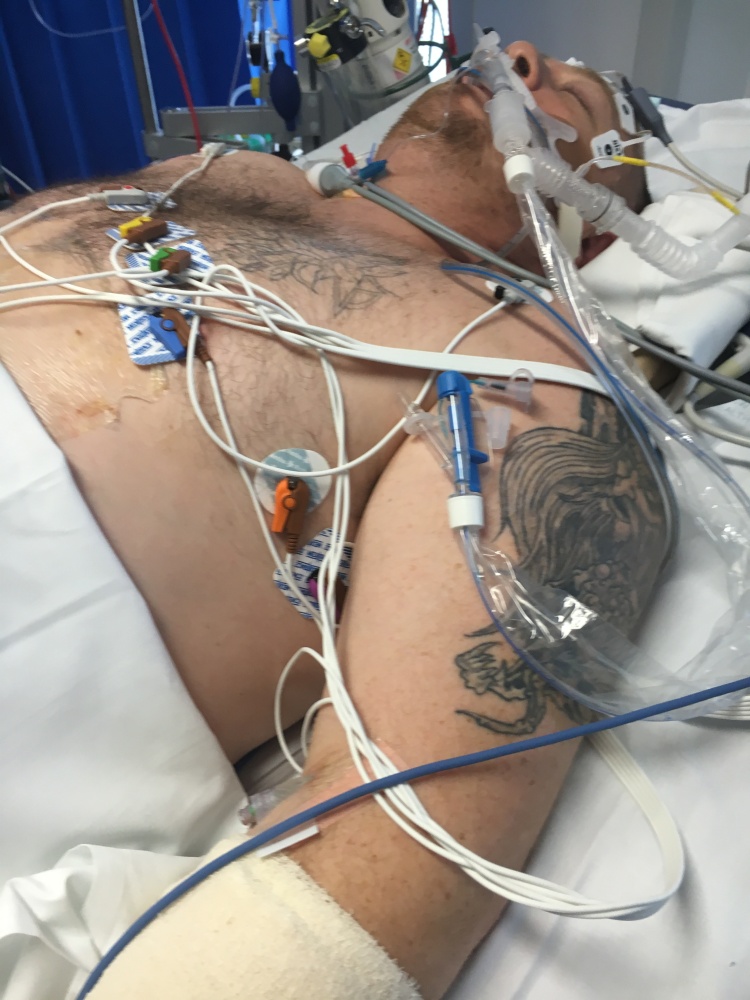
DALLIANCE WITH DEATH
I love sharing my husband’s story because it is not just about spreading awareness about brain injury, it drives people to ask themselves what would I do if I were in that situation? People have confessed to me that they would not be able to do what I do. Friends, family members, friends of friends, people I have just met… have told me this. That’s okay. At least it has you thinking about it. Never in a million years did I think something like this would happen to me and my family, but here we are…making the most of it.
As I write this, Paul is watching me intently. Im sure he’s wondering how much of his life am I sharing with the world. Well, my darling, I promise anything I write about you will not be published without your blessing. Paul has given me two strong blinks in approval. Most of the time, this is how we communicate- with eye blinks. Two blinks indicate “yes” and no response for “no”. Paul injured the frontal lobe part of his brain. It’s the one that controls speech (Broca’s area for those of you familiar with brain anatomy and function.) He is unable to speak.

Paul spent almost 3 months in a coma and I knew very early on in the piece that his cognition is not as bad as what medical staff predicted for him. I will never forget our first family meeting at the hospital after the accident. The chief doctor of ICU was present, a nurse, me, my mother in-law and my father in-law also. There we were, sitting around a table in a claustrophobic hospital meeting room. The air was filled with a potent aroma of hospital-grade disinfectant- that distinctive smell all hospitals have. Words like “vegetable” and “nursing home” were being thrown around by the doctor as we sat, dumbfounded at the enormity of the information we were being fed. Doctors are clearly skilled at choosing their words carefully when speaking to shocked and grief- stricken family members. “I think we should let nature take its course,” he said to us. Translation: “Lets turn your husbands ventilator off so we can free up the bed for the next young, male, daredevil who thinks he can cheat death.” I wasn’t ready to pull the plug on my husband yet. Paul has always been the most determined person I have ever met. If anyone was going to recover from this, it was going to be him, with me by his side all the way.
As I look at Paul now, he certainly does not look like a vegetable…..but if I had to describe him as one, he’d be a 78kg carrot. Much lighter than the 118kg potato he was when he had the accident. He weighed himself only two nights before. He nearly died then, when he saw how much his weight had crept up. Im pretty sure that was the heaviest he had ever been. He is actually more of a turnip these days. Its time to go outside for some much needed sun.
Paul is unable to talk but he can understand everything I’m saying. He can read too. From the time he was laying in the hospital bed, eyes shut and showing signs of waking from his comatose state, I knew things were going to be challenging but doable. He opened his eyes for 20 minutes one day for his mum. She was so excited when she told me. Why can’t you do that for me? No response. Then his dad would call me to say “Paul squeezed my hand last night!”
“Why don’t you ever squeeze MY hand?” I ask him with my fingers entangled in his. I then feel the gentlest pressure of his fingers on mine. Did I imagine that? Maybe it was just a coincidence. I beg him to do it again. Nothing. Nil. Nix. Naught….. He then gives me the mother of all hand squeezes! Holy shit! He can hear me! I could not wait to tell the world!
Like anyone else with a brain injury, Paul has good days and not-so-good days. In fact, its not just exclusive to brain injury survivors. Like the rest of us, mood, pain, weather, noise, light, activities, people, medication, kids and mother in-law’s, all determine the disposition of the day. Today, Paul’s responses to yes/no questions were quick and deliberate. Yesterday’s responses took more than 30 seconds. Granted, we had visitors which means several conversations were going at once. Paul often struggles to keep up with ONE conversation let alone two or three around the table at the same time. Then the kids are fighting over the remote. The coffee machine is working overtime and the radio is filling the air with the soothing sounds of Metallica. I want to bury my head in a pillow and scream so I can only imagine what is going on in Paul’s head. SHUT THE F*** up!!! Thank goodness for earplugs.
Having a voice is something we all take for granted. Imagine not being able to tell someone you love them, or letting them know you’re in pain. This is a daily struggle for Paul. Apart from the obvious disadvantages of having a husband who is non- verbal, there are some surprising perks. Paul and I haven’t argued, squabbled, or misunderstood each other since the accident. He can’t tell me if I’m spending too much money on clothes or handbags. He can’t tell me if my cooking is crap or if my mother is being unreasonable. Day by day, as his sounds become stronger, his voice gets louder and his words become sharper, I’ll be there, ready to listen to whatever he needs to verbally hurl my way.
Vicki xxxx

This was Paul on day 2 after the accident in July 2016. Critical but stable with the help of a ventilator and strong coma-inducing drugs.
Questions? Comments? Drop me a line at thecarefactor.tbi@gmail.com